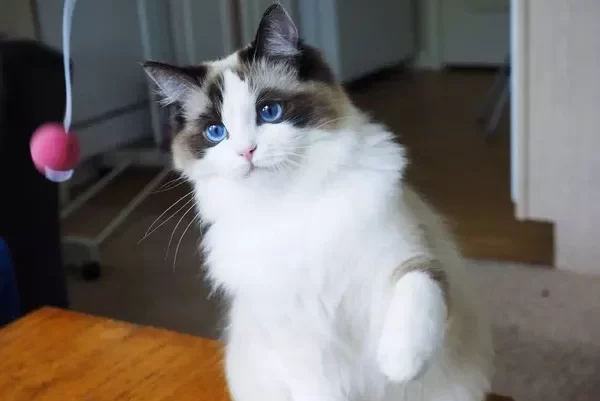An alarming situation is unfolding in the world of animal rescue as the Lewiston-Clarkston region contends with a growing crisis of lost and abandoned pets. Rescue organizations are sounding the alarm, with one group dubbing it a “cat-astrophe.”
At a recent Helping Hands Rescue adoption event held in an empty storefront near the old Shopko building in Lewiston, stories of heartwarming interactions between prospective pet owners and furry companions unfolded. Among them was 14-year-old Audrey Waddell from Clarkston, who desperately pleaded with her father to adopt a caramel-colored kitten.
“I love cats,” Audrey expressed passionately. “They’re so therapeutic, and I love when they, like, jump all over you and they attack your fingers and stuff like that. He’s super fluffy and reminds me of a bunny I used to have.”
In another corner, Christina Campbell of Clarkston was on the hunt for a companion for her chiweenie, Chance, as she sought another chiweenie named Torrie. The periodic adoption events hosted by Helping Hands are part of a broader effort to find homes for the surging number of cats and dogs that have been lost or abandoned in the past year, a situation characterized by Cathy Carlson, a Helping Hands volunteer, as a “cat-astrophe.”
Carlson emphasized the dire nature of the situation, revealing that the all-volunteer organization currently cares for more than 100 cats in foster homes, with an ever-increasing influx of felines being turned away due to space constraints.
This issue of lost and abandoned pets isn’t unique to Helping Hands; many other animal rescue and foster organizations across the region face similar challenges. These groups operate primarily through the dedication of volunteers, relying on donations and fundraising efforts to sustain their operations. Furthermore, they rely on a handful of veterinarians who provide spaying, neutering, and vaccination services at reduced rates.
Even the limited shelters in the area, such as the Lewis Clark Animal Shelter, McPaws Regional Animal Shelter in McCall, and SpokAnimal Care in Spokane, often operate at full capacity and are unable to accommodate homeless animals.
The core of the problem, according to Carlson, is that many people either refuse or cannot afford to have their pets spayed or neutered, creating an unending cycle of reproduction. Cats that are not spayed or neutered lead to more kittens, which often remain unaltered, perpetuating the problem.
Mada Schneider, another Helping Hands volunteer and foster parent, echoed this sentiment, noting that people who neglect spaying and neutering their pets can quickly become overwhelmed. She cited an increasing number of calls from individuals with an “overabundance of cats” showing up unexpectedly in their homes, sometimes numbering up to 50.
Helping Hands often takes in animals that belong to owners who have passed away or become disabled without making prior arrangements for their pets. The lack of forethought on the fate of these animals adds another layer of complexity to the situation.
The costs associated with spaying and neutering cats vary, typically ranging from $50 to $100 in the region, while vaccination prices start at approximately $15 and increase from there. Some animal welfare organizations, such as the Lewiston animal shelter, offer reduced rates, while others, like the Animal Rescue Foundation at Grangeville, provide vouchers for medical treatment and other essential needs.
While cost is undoubtedly a factor, Schneider believes that laziness also contributes to the issue. Years of dealing with this problem have taken a toll on many Helping Hands foster families, and some have been forced to step back due to exhaustion.
Audrey Williams, director of operations at Lewis Clark Animal Shelter, highlighted another aspect of the crisis: an increasing number of stray dogs that find their way to the shelter, with no owners coming forward to claim them. In some cases, individuals who claim to have found a stray animal are actually pet owners seeking to abandon their responsibilities.
Williams noted that the shelter serves a broad area, including the city of Lewiston, Nez Perce County, the Nez Perce Tribe, Idaho State Police, Clarkston, Asotin, and Asotin County. This places a significant burden on the shelter’s resources, especially considering it serves both Idaho and Washington.
While the shelter has provided reduced-cost spaying and neutering services, Williams revealed that the vet who worked with the shelter recently retired, leaving a gap in services. The shelter has initiated a building campaign, “Building for the Paws,” to construct a new facility in the Lewiston Orchards area. The campaign has raised approximately $2.5 million out of an anticipated $7 million for the project.
Sherrie Chamber of the Clearwater Humane Society in Orofino emphasized that they continue to witness an increase in lost and abandoned pets. The organization strives to assist by facilitating spaying, neutering, and vaccination services for pets in need, particularly those owned by individuals who are unable to afford these essential procedures.
Despite the challenges, these organizations are committed to their mission of rescuing and caring for animals in need. As the crisis intensifies, they urge the community to support their efforts to mitigate the challenges posed by the growing population of homeless pets.


























